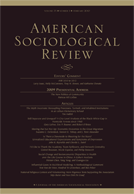
Widowhood and Race
Abstract
The health effects of marital status are frequently cited in the current debate on marriage promotion, but little is known about how marital health effects vary across groups. This article assembles the largest properly longitudinal and nationally representative dataset of elderly married couples in the United States (N = 410,272 couples) and provides strong evidence that the “widowhood effect”—how the death of a spouse increases the mortality of the survivor-varies substantially by race. The authors find that whites married to whites suffer a large and enduring widowhood effect. By contrast, blacks married to blacks do not suffer a detectable widowhood effect, possibly because they manage to extend the survival advantage of marriage into widowhood. For racially intermarried men, wife's race appears to dominate the size and presence of the widowhood effect entirely, regardless of husband's own race. These results likely arise from differences in the marital cultures and marital contexts of black and white couples. More generally, these results demonstrate that the health effects of social ties depend on the individual attributes of the actors they connect.
Citation:
F. Elwert and N.A. Christakis, "Widowhood and Race" ASR: American Sociological Review, 71(1): 16-41 (February 2006)